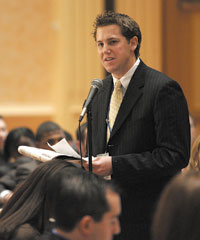NCAA News Archive - 2007
« back to 2007 | Back to NCAA News Archive Index
SAAC supports elimination of electronic recruiting tools
|
By Michelle Brutlag Hosick
The NCAA News
The NCAA News
ORLANDO, Florida — The proposals concerning text messaging and other forms of computer-mediated communication generated some discussion at the Division I legislative forum January 7, particularly from members of the Division I Student-Athlete Advisory Committee. They strenuously supported eliminating all forms of electronic communication in the recruiting process, an idea that is in the legislative cycle as Proposal No. 06-40 sponsored by the Ivy Group.
Tyler Kupper, a golf student-athlete from the University of Delaware, pointed out that he will never receive a text message from a potential employer offering him a job or recruiting him for a job. He called the practice an “inappropriate way to recruit” that causes coaches to sacrifice time with their current student-athletes to pursue prospects.
In the event that the Ivy proposal is defeated, SAAC members indicated they would support an Academics/Eligibility/Compliance Cabinet-sponsored proposal that would place limits on computer mediated communication to certain times and days of the week (though the Council later defeated that measure). Sponsors of both proposals indicated part of their motivation for creating the legislation was to get the membership discussing the issue and thinking about possible remedies.
AEC Recruiting Subcommittee Chair Petrina Long, senior associate athletics director at the University of California, Los Angeles, said the response to her group’s proposal had been varied. She said the subcommittee had met with some student-athletes who, unlike the SAAC members, said text messaging was their preferred method of communication and limits on the practice would be a positive step.
SAAC members also spoke in favor of Proposal No. 06-71, which would permit institutions to provide a training-table meal per day to student-athletes who are on partial scholarship or are walk-ons. Mike Piscetelli, chair of the SAAC, said that walk-ons and those on partial scholarship have all the same responsibilities as their teammates on full grants-in-aid but “can’t cross lines a full grant-in-aid student-athlete can cross.”
Piscetelli, who was a walk-on track and field student-athlete at Wake Forest University, said the legislation would help diminish some of the stigma a walk-on or partial-scholarship student-athlete feels — and would be a good way to provide a balanced meal to a student-athlete during the season.
Proposal No. 06-60, which would require institutions to certify that student-athletes have completed six semester or quarter hours of credit in the preceding term to participate in postseason competition between terms, also generated some discussion at the forum.
Etienne Thomas, compliance director at San Jose State University, and Chris Dawson, associate commissioner of the Pacific-10 Conference, both spoke in opposition to the proposal, which they say would place an unfair burden on some institutions to certify student-athletes in an extremely tight time frame. Additionally, quarter schools would be forced to certify their student-athletes more often than institutions that use the semester system.
Tyler Kupper, a golf student-athlete from the University of Delaware, pointed out that he will never receive a text message from a potential employer offering him a job or recruiting him for a job. He called the practice an “inappropriate way to recruit” that causes coaches to sacrifice time with their current student-athletes to pursue prospects.
In the event that the Ivy proposal is defeated, SAAC members indicated they would support an Academics/Eligibility/Compliance Cabinet-sponsored proposal that would place limits on computer mediated communication to certain times and days of the week (though the Council later defeated that measure). Sponsors of both proposals indicated part of their motivation for creating the legislation was to get the membership discussing the issue and thinking about possible remedies.
AEC Recruiting Subcommittee Chair Petrina Long, senior associate athletics director at the University of California, Los Angeles, said the response to her group’s proposal had been varied. She said the subcommittee had met with some student-athletes who, unlike the SAAC members, said text messaging was their preferred method of communication and limits on the practice would be a positive step.
SAAC members also spoke in favor of Proposal No. 06-71, which would permit institutions to provide a training-table meal per day to student-athletes who are on partial scholarship or are walk-ons. Mike Piscetelli, chair of the SAAC, said that walk-ons and those on partial scholarship have all the same responsibilities as their teammates on full grants-in-aid but “can’t cross lines a full grant-in-aid student-athlete can cross.”
Piscetelli, who was a walk-on track and field student-athlete at Wake Forest University, said the legislation would help diminish some of the stigma a walk-on or partial-scholarship student-athlete feels — and would be a good way to provide a balanced meal to a student-athlete during the season.
Proposal No. 06-60, which would require institutions to certify that student-athletes have completed six semester or quarter hours of credit in the preceding term to participate in postseason competition between terms, also generated some discussion at the forum.
Etienne Thomas, compliance director at San Jose State University, and Chris Dawson, associate commissioner of the Pacific-10 Conference, both spoke in opposition to the proposal, which they say would place an unfair burden on some institutions to certify student-athletes in an extremely tight time frame. Additionally, quarter schools would be forced to certify their student-athletes more often than institutions that use the semester system.
© 2010 The National Collegiate Athletic Association
Terms and Conditions | Privacy Policy

